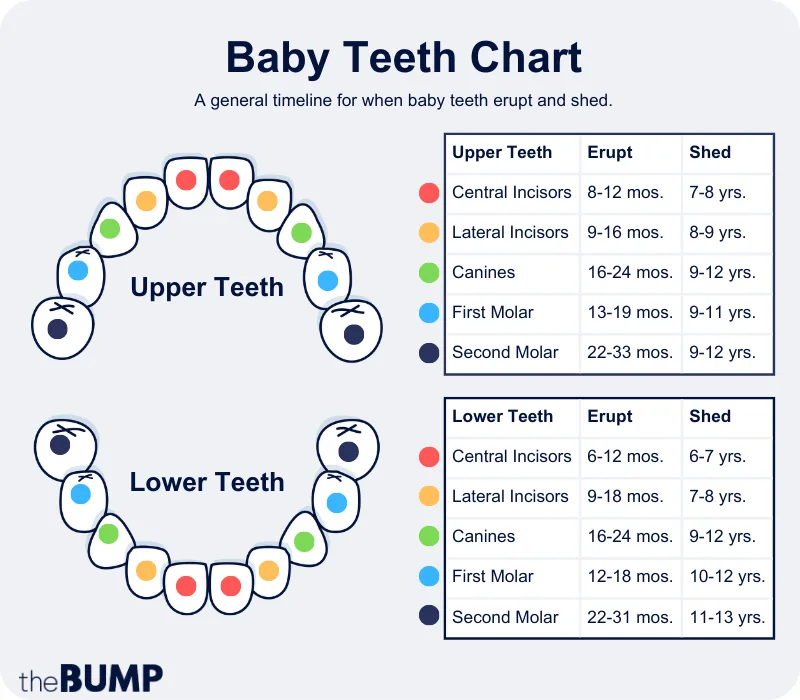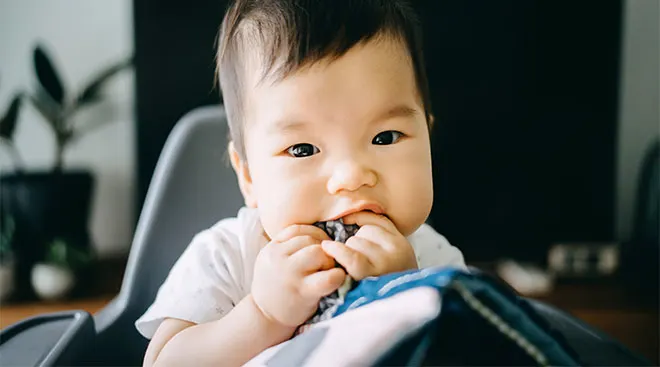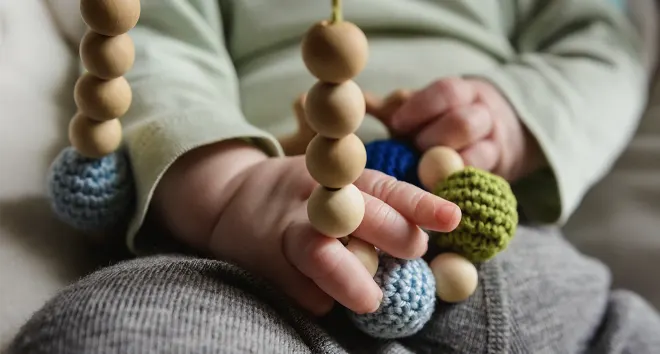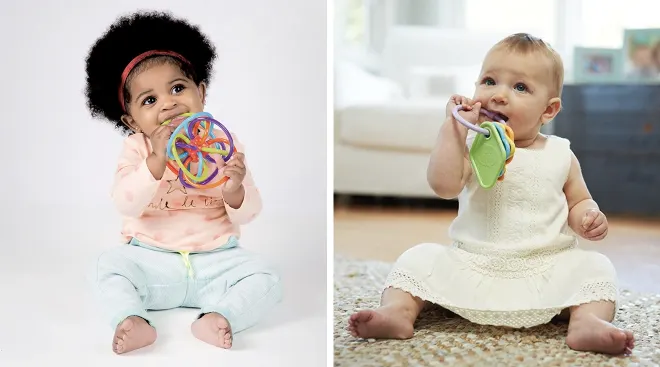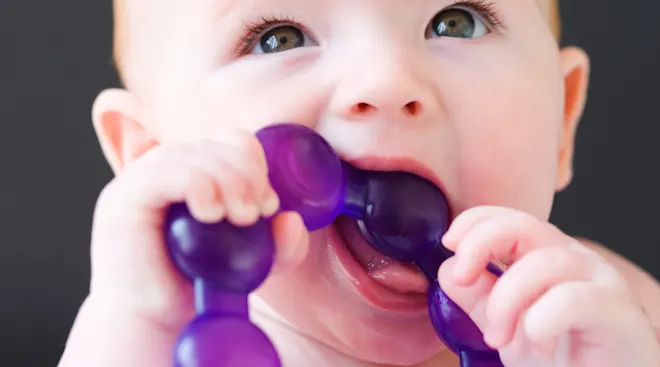Baby Teeth Basics: Everything You Need to Know
During those first few months and years of life, one by one (or two by two), baby teeth will start breaking through. While this is an exciting milestone, it can lead to some curious questions. For starters, when do babies get teeth? How many baby teeth typically appear—and in what order? Can babies be born with teeth? And, finally, when do baby teeth fall out? Rest assured, we turned to experts to get all the answers you’re looking for. Keep reading to learn everything you need to know about baby teeth.
First things first: When do babies get teeth? According to Danette Ocegueda, a registered dental hygienist and a professional education manager with Philips Oral Healthcare, most babies begin to develop baby teeth while in utero. In fact, teeth begin to form as early as 6 weeks during pregnancy, according to Johns Hopkins Medicine. Babies start to develop their permanent adult teeth under the gums around birth and throughout childhood. You’ll see their baby teeth come in between 6 and 33 months, as the development of the permanent teeth will start to push out baby teeth.
That said, there’s no set baby teeth schedule; the timeline for when baby teeth start to come in will vary significantly from child to child. Anytime between 3 months to one year is considered normal. “This process continues throughout childhood,” Ocegueda explains. But “usually [kids] have their full mouth of baby teeth by 3 years old,” adds Ashley Lerman, DDS, a board-certified pediatric dentist at Firstgrin. If baby teeth don’t sprout by the 15-month mark, you should reach out to your pediatrician or dentist, advises Monica Cipes, DMD, MSD, the founder of Cipes Pediatric Dentistry in West Hartford, Connecticut. Although there’s a range of variability, this is a good time to check in to make sure everything is okay.
How many baby teeth do kids have?
It’s a common question: How many teeth do babies have? The answer is 20 (10 on top and 10 on the bottom), says Denise Scott, MD, an Oklahoma-based pediatrician and expert with JustAnswer. This is on average 12 teeth fewer than what baby will have in adulthood.
Do baby teeth have roots?
Yes, baby teeth do have roots. As baby teeth fall out, the roots are reabsorbed into the surrounding gum tissue, Lerman says. This helps make way for adult teeth coming in. If for some reason, the root of a baby tooth fails to reabsorb naturally, you’ll want to visit a pediatric dentist for some guidance and potential treatment.
Wondering if babies can be born with teeth? The answer is yes—it’s a condition called “natal teeth.” (Conversely, baby teeth that come in a few months after birth are referred to as “milk,” primary or neonatal teeth.) It’s important to note that these are not extra teeth (though this too can happen in rare cases), Lerman says, but rather “early eruptions of teeth that’ll erupt in the mouth naturally later on. She adds that natal teeth tend to fall out naturally the way regular baby teeth do. Plus, if baby is born with teeth, there’s usually only one or two of them, Scott adds. Wondering how common it is to have a baby born with teeth? Not very—natal teeth only occur in approximately 1 out of every 2,000 to 3,000 births.
Most babies born with teeth don’t experience significant issues, Lerman notes, but parents should still have baby evaluated by a pediatric dentist. Unlike regular baby teeth, natal teeth are usually underdeveloped and more likely to have weak roots, since they attach to the gum by soft tissue, Ocegueda explains. If baby is born with teeth, they may need to be removed, as they can pose a series of issues, including:
- Feeding difficulties
- Irritation, injury or ulcerations to baby’s tongue due to friction while nursing
- Discomfort for the nursing mom or injury to the nipple
- Risk of a choking hazard if a tooth breaks loose and is swallowed or inhaled by baby
- Potential early decay of natal teeth, if they’re not well formed
- Overcrowding of the teeth later on
- Possible cavities, as natal teeth have abnormal and underdeveloped enamel
Lerman recommends getting the opinion of a pediatric dentist, as they can best help you decide the best course of action or treatment, if needed.
Baby teeth usually erupt in a predictable order, but keep in mind that just as babies will get their teeth in at different times, the order of baby teeth can also vary. The first baby teeth that come in are usually the two bottom front teeth (called central incisors), followed by the two top front teeth (called upper central incisors). Next are the lateral incisors (which are on either side of the front teeth) on both the upper and lower gum lines. After these, Lerman and Scott say the first four molars (bottom and top teeth next to the canines) will erupt, followed by the four canine teeth and, finally, the second four molar teeth (at the back of the mouth). Again, it’s important to remember that while this is often the predictable pattern you can expect, the actual baby teeth order can vary.
The baby teeth chart below gives you a pretty good idea of what you can expect when it comes to baby teeth coming in and falling out. Keep in mind, however, that according to experts, there’s a significant range for when and how this will happen. Reach out to your pediatrician if baby’s teeth aren’t coming in as expected or if you have questions or concerns.
Babies usually start teething around 4 to 5 months, but this can happen as early as 3 months or even after 6 months, Lerman says. Scott adds that, while babies may begin teething early on, their first tooth may not appear until they’re between 6 and 12 months old. While some babies may not present any bothersome teething symptoms, others may experience drooling or even a low-grade fever. (Read more about when babies start teething, symptoms to look out for and ways to help them find relief.)
It’s important to care for baby gums before teeth erupt, as “oral care begins before the first tooth appears,” Ocegueda says. Experts recommend using a wet washcloth, damp gauze, infant gum brush or a soft baby toothbrush to gently clean the gums. This is important because “residual sugars in breast milk and formula may spur bacteria growth,” Ocegueda explains. Lerman also recommends gently wiping baby’s gums after feedings to get rid of any milk residue. What’s more, brushing baby’s gums before teeth erupt can help soothe teething pain, as well as encourage baby teeth to come in more readily.
You’re already caring for baby’s gums, but you also start brushing their teeth as soon as you see them start to pop up. “Plaque can begin building on the tooth surface and potentially cause decay—even on baby teeth,” Ocegueda says. Plus, baby teeth inform the structure of the jaw and speech development, so it’s important to establish and maintain good oral hygiene for baby at a young age. The habit also gets baby comfortable with the routine and helps desensitize them to the feeling of something brushing their mouth, Lerman says. Use a soft baby toothbrush and water to start brushing baby’s teeth. Learn more about how to brush baby’s teeth here.
According to Lerman, children should see a dentist by their first birthday or within six months of their first baby tooth coming in—whichever happens first. From there, they should have two routine checkups a year. “Starting an oral care routine early is crucial to promoting healthy habits for a lifetime,” Ocegueda emphasizes. (Learn more about baby’s first dental visit here.)
Much like baby teeth coming in, the timing for when baby teeth fall out will differ from child to child. Typically, the tooth fairy’s first visit comes around age 5 or 6, but it may occur as early as 4 or as late as 7. Usually, teeth are lost in the order they came in, as baby teeth falling out makes room for permanent teeth to come in. “When an adult tooth is coming in, it comes in under the baby tooth it’s replacing,” Cipes explains. But it’s normal for some adult teeth to come in from behind the baby teeth as well. If baby teeth are still around when the adult teeth start to emerge, check in with your dentist to make sure everything is growing properly. The timing of when baby teeth fall out can also vary based on genetics and other factors, Lerman adds. “Some kids may not have an adult tooth underneath the baby tooth to replace it,” she says. “That’s part of the reason why it’s important to have early visits with a dentist to keep an eye on growth and development, as well as overall oral health.” Children usually lose all their baby teeth by the time they’re 12.
Watching a baby tooth come in can be a painfully slow but, nevertheless, exciting event for you and your little one. Set your kiddo up for success by teaching them good oral hygiene and healthy habits as soon as you see that first little tooth poking through baby’s gummy smile.
Please note: The Bump and the materials and information it contains are not intended to, and do not constitute, medical or other health advice or diagnosis and should not be used as such. You should always consult with a qualified physician or health professional about your specific circumstances.
Plus, more from The Bump:
Monica Cipes, DMD, MSD, is a pediatric dentist with over 30 years of experience and a private practice, Cipes Pediatric Dentistry, located in West Hartford, Connecticut. She received her dental degree and specialty certification in pediatric dentistry from the University of Connecticut School of Dental Medicine, as well as a master’s degree in dental science from University of Connecticut’s Department of Behavioral Sciences. She also serves as a faculty member at the University of Connecticut School of Dentistry.
Ashley Lerman, DDS, is a board-certified pediatric dentist and the founder of Firstgrin, which provides personalized oral care boxes to help caregivers focus on dental health from a young age. She received her bachelor's degree from the Rensselaer Polytechnic Institute and earned her doctorate of dental surgery from Columbia University College of Dental Medicine.
Denise Scott, MD, is a pediatrician with JustAnswer and a pediatric endocrinologist based in Oklahoma with over 30 years of experience. Certified in culinary medicine, Scott also runs the blog Feed Future Health and is the author of Feed Your Child's Future Health: Prevent Disease before it Starts. She received her medical degree from the University of Texas Medical Branch and completed her residency at the University of Oklahoma Health Sciences Center, with a fellowship at the National Institutes of Health.
Danette Ocegueda is a registered dental hygienist with over 30 years of experience, as well as a professional education manager with Philips Oral Healthcare. She earned her master’s degree in dental hygiene education from University of Missouri-Kansas City.
Johns Hopkins Medicine, Anatomy and Development of the Mouth and Teeth
Learn how we ensure the accuracy of our content through our editorial and medical review process.
Navigate forward to interact with the calendar and select a date. Press the question mark key to get the keyboard shortcuts for changing dates.

































